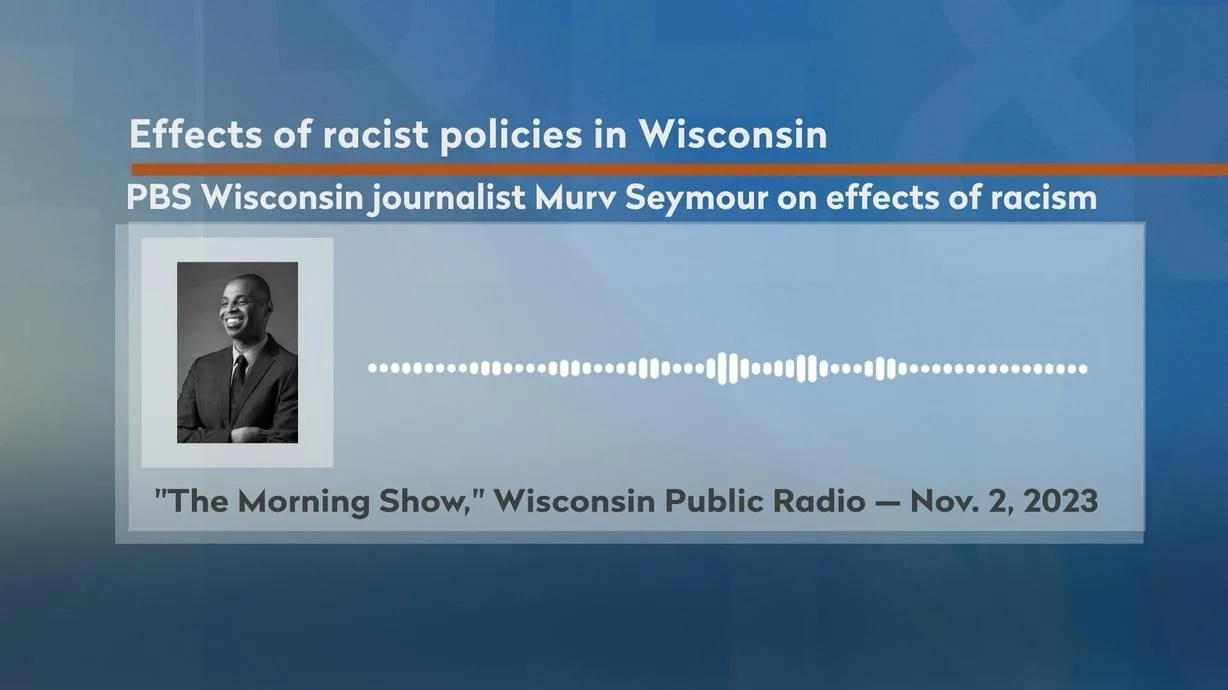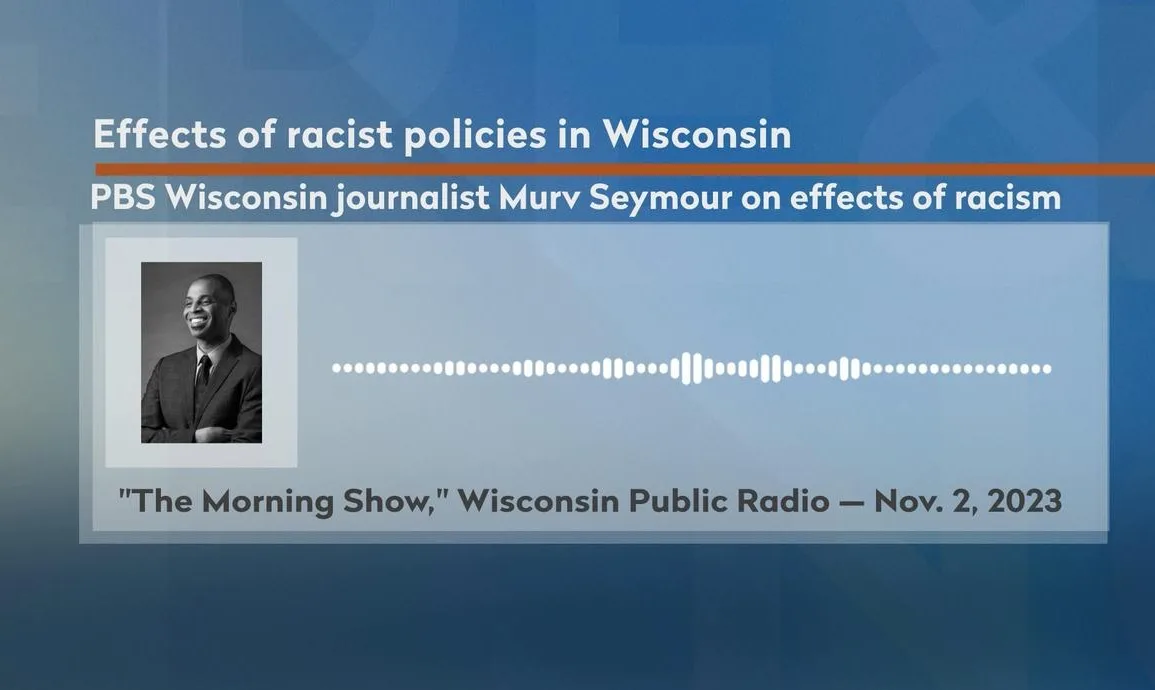
[music]
Kate Archer Kent:
It is “The Morning show.” I’m Kate Archer Kent. PBS Wisconsin launches a new series, called “Wisconsin in Black & White,” shedding light on the effects of racism through generations, and you can be part of this conversation. Call in with a question, share your views, 800-642-1234, or email [email protected]. Murv Seymour is a special projects journalist for PBS Wisconsin’s News and Public Affairs program, Here and Now, worked on this series. Murv, welcome back to the Ideas Network.
Murv Seymour:
Good morning, Kate, thanks for having me this morning.
Kate Archer Kent:
Good morning, the series talks about the through-line between slavery and incarceration and the overrepresentation of Black people in prisons now. How different is Wisconsin from other areas of the country?
Murv Seymour:
Well, you look at the numbers, and numbers tell a story. Wisconsin leads the nation in the incarceration of Black men. Blacks in the state of Wisconsin represent about 6% of the population, but about 42% of those who are incarcerated. So if you took 36 Blacks and put them in a classroom per se, one in 36 of those Blacks would find themselves being incarcerated. So nationally, Blacks are about five times more likely to be incarcerated than White folks. And here in the state of Wisconsin, that number is 12 times more likely than a White person here in the state of Wisconsin. So the numbers tell the story, and it’s not a very pretty story for lots of people, obviously.
Kate Archer Kent:
You talked with so many people about this issue, and I’m just wondering, these were very raw, very real interviews. What stood out to you in how you went about talking about this series and hearing from so many different people from all walks of life?
Murv Seymour:
Well, it’s interesting. As a journalist, you follow where…
Kate Archer Kent:
The story takes you, yeah.
Murv Seymour:
Yeah, you go where it takes you. And as we dug into this, and this is a really, really huge effort between us and the Nehemiah Center, and we had a huge team. This process has been going on for probably over four years, and I just stepped into it a few years ago when I started at PBS Wisconsin. But I think we really learned a lot from just seeing how a lot of these issues are connected to each other. We broke it down into the criminal justice system, education, economic empowerment, and health and wellness. And you find out that over policing and the history of arresting Black folks who are doing minimal crimes, that takes people away from their family, that affects income. Then laws with education affects the ability to be educated and that affects your ability to get a job. And the stresses from oppression and those sort of things affect your health, and birth rates and all these other things, and everything is really connected. And I learned so much about that connection and how it’s all intertwined with each other.
Kate Archer Kent:
Some people in the series are calling on federal and state governments to take accountability for issues in the criminal justice system. And how could Wisconsin authorities take accountability for the system’s problems and the disparities that are so pronounced?
Murv Seymour:
Well, these are calls that have been going on for, as we know, decades, and I guess it starts probably with law and policy. That’s really where the action takes place. Obviously, advocates are calling for more funding towards education and not prisons. Even former Wisconsin Governor Tommy Thompson, who has the notoriety of building more prisons in the state than any other governor. Today, he’s all about education for folks that are incarcerated. He’s all about giving them the tools they need that will allow them to be a more productive once they leave the prisons. And people wanna see more funding towards community-based programs, like drug treatment and prison diversion programs and really just offering alternatives to prison. And talking with Secretary Carr about some of these things, he’s pretty straight up about these are things that he’s looking into and wants to do what he can to push in that direction in terms of trying to create what they call a more trauma-based care towards incarceration, which means you’re just being, providing the tools that someone needs, so they are not just coming out here without any kind of support in terms of giving themselves a chance to get back on their feet.
Kate Archer Kent:
Yeah, so you talked with the secretary for the Wisconsin Department of Corrections, Kevin Carr. We’re talking with Murv Seymour, PBS Wisconsin journalist, worked on the series “Wisconsin in Black & White.” Call in with a question. You can share your comments along the way. 800-642-1234. I’m Kate Archer Kent. You’re listening to “The Morning Show” on the Ideas Network.
[music]
Kate Archer Kent:
It is “The Morning Show.” I’m Kate Archer Kent. A new series from PBS Wisconsin, it explores how racist policies in our state’s history affect people’s lives today. Murv Seymour is a special project journalist for PBS Wisconsin, worked on “Wisconsin in Black & White.” You can add your voice, call in with a question, you can share your thoughts, 800-642-1234, email [email protected]. Murv, you interviewed Reverend Greg Lewis in Milwaukee, who says people elsewhere are unfamiliar with the prevalence of racism in Milwaukee.
Rev. Greg Lewis:
When I go to other places, people don’t even know that Milwaukee have Black folks living here. You say, “Black folks in Milwaukee?” Yeah, and they being oppressed like crazy.
Kate Archer Kent:
And he also called Milwaukee “the Selma of the North.” That stood out to me. How much do people in Wisconsin understand systemic racism in the state?
Murv Seymour:
That’s a great question, and I think that’s one of those answers where it depends on who you talk to, right? The person who’s living it every day, the person who is being profiled, the person who is being IDed when everybody else isn’t being IDed, the person being singled out, they understand it. They may not understand it in terms of the term systemic, but they certainly understand it in terms of living it. And I know as an African American myself, I’ve certainly seen situations like that. And you spread out in some of the rural parts of Wisconsin, and maybe people don’t know that much about it, and probably most don’t, because it’s not something they would probably think about, because it may not affect their immediate lives. So I really think that’s one of those things that it really depends on who you talk to, but I would say, most people don’t know about and understand systemic racism and how it works, and I certainly had to learn some things as I dove into this, because it really speaks to how our government on a national level and then obviously at a state level created these policies that disenfranchised so many people of color in terms of loans for housing during a time when everyone…
Kate Archer Kent:
Redlining.
Murv Seymour:
…had opportunities to do those sorts of things. So yeah, it really depends on who you talk to.
Kate Archer Kent:
Let’s turn to the work of the Nehemiah Center for Urban Leadership Development in Madison. Dr. Alex Gee, you interviewed Gee, and he says people avoid recognizing their culpability for racism within schools.
Dr. Alex Gee:
We want to fight against racism, but when we don’t properly address it, the educational systems themselves become breeding grounds for racism.
Kate Archer Kent:
Why do people avoid taking that responsibility?
Murv Seymour:
Oh, that’s another million dollar question. Obviously, it’s an extremely uncomfortable topic for, I think, most people. It’s a heavy weight to tow for people that get involved in the conversation. It hurts, it’s painful. The history of how we got here is certainly painful. And I think a lot of people look at it and say, “Well, it doesn’t affect me.” And there are folks out there that do step up and say that I’m going to get involved, and I’m going to do something to affect change. But I think there’s a certain level of fear that people have, and I think there are folks too that are concerned about how it’s gonna impact their business relationships and personal relationships. What are other people gonna think if I stand for this or stand for that? So yeah, a really complex solution to something like that.
Kate Archer Kent:
One breathtaking moment in one of your interviews, the person said, “White society is addicted to racism,” and it’s a line that just was, it’s scary, and it has many layers to it. Did that stand out to you?
Murv Seymour:
I do, I think you’re speaking of a soundbite from Associate Professor Ion Meyn in the Wisconsin Law Department. And so much of this is a perspective that everyone, we all have different perspectives based on our experiences and Ion Meyn’s a person who teaches law and has worked on the front lines of the civil rights and worked with innocence types of projects helping free people who are wrongly convicted, and that’s his experience. And we certainly, as an organization, let people express what they felt based on what they’ve experienced. So yeah, some of it, it really is tough to hear. For me personally, some of it’s not surprising, but to hear other people say it and see it that way, and to be willing to say it, I think that’s part of how we move the needle is being honest and letting people express what is the reality of this ugly thing that we’re dealing with in systemic racism.
Kate Archer Kent:
Murv Seymour, special projects journalist for PBS Wisconsin worked on this series that looks at the lasting effects of systemic racism. You can join in your questions and comments, 800-642-1234. Murv, you examined why talking about race in schools is difficult. Kaleem Caire, founder and and CEO of One City Schools in Madison, there’s his voice in this piece. And here’s Caire answering your question about why talking about race can be difficult.
Kaleem Caire:
We have divorced ourselves from the problem that it is not only something that I’m embarrassed or don’t want to be culpable in, but it’s been persistent for so long. I’ve heard people say that like, “I can’t focus on the problem, “’cause it just brings me down, ’cause it’s like, we’ve not solved it, it’s not gonna be solved,” and so I think there’s a lot of hopelessness. We also live in a state that, by and large, has been privileged for a very long time. And so when you’re privileged and things are going OK, and you don’t have to focus on the issue, you act like it doesn’t exist.
Kate Archer Kent:
What would you tell people who relate to that sentiment, that the pervasiveness of racism leads to that feeling of hopelessness?
Murv Seymour:
Well, I think that’s certainly a natural emotion when you’re dealing with the pain and oppression and struggle. I’d say that when you think about the history of slavery and civil rights, you’ll notice that people still strived and move forward. And it’s really one of the questions that I posed to Dr. Christy Clark-Pujara, who teaches history here at the University of Wisconsin. I said, “Man, how did Black people survive all this?” And it’s a mix of faith. It’s a mix of hope. And a lot of this is just perspective, how you look at things. We can choose to have hope or choose to be hopeless. And it may sound a little simple, but I think that’s the way some people do look at it, and now we’re looking at this movement, this social justice movement, which it’s not new, it certainly isn’t new, but it may be new in terms of how people have been affected by the things that are going on. And so, you have to look at the… You can’t get overwhelmed by the big picture of the challenge of trying to solve all these issues. You can only do what you can do and do a little piece at a time and hopefully, the needle starts to move and begin to move and through education and awareness.
Kate Archer Kent:
Murv, thank you for joining us.
Murv Seymour:
Kate, I really appreciate you letting us come on to promote and talk about this upcoming screening. I think it’s gonna be an incredible event for folks in the community to learn about systemic racism here in the state.
Kate Archer Kent:
Murv Seymour, a special projects journalist at PBS Wisconsin’s Here and Now.
[music]
I’m Kate Archer Kent. You’re listening to “The Morning Show” on the Ideas Network.
[music]



